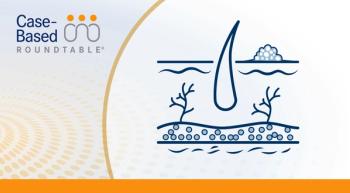
Promising Phase 3 Study of CPI-613 in Metastatic Pancreatic Cancer Achieves Target Enrollment Early
In an interview with Targeted Oncology, Philip A. Philip, MD, PhD, discussed the current therapeutic options for patients with metastatic pancreatic cancer and where CPI-613 may fit into this treatment landscape.
The pivotal phase 3 AVENGER 500 clinical trial has completed its target enrollment of 500 patients ahead of schedule, according to a press release. The global trial will evaluate the efficacy and safety of CPI-613 (devimistat) in combination with a modified regimen of folinic acid, fluorouracil, irinotecan, and oxaliplatin (FOLFIRINOX) as frontline treatment of patients with metastatic pancreatic cancer.
This is the largest phase 3 study currently open for patients with metastatic pancreatic cancer and is being conducted across 75 sites around the world in the United States, South Korea, Israel, Belgium, France, and Germany, among others.
CPI-613 is a first-in-class compound targeting enzymes involved in cancer cell energy metabolism. The agent has been developed to selectively target the mitochondrial tricarboxylic acid cycle, which is a process essential to tumor cell multiplication and survival.
In the frontline setting, patients receive standard of care treatment of either FOLFIRINOX or gemcitabine in combination with nab-paclitaxel. However, when patients fail on the standard of care, the treatment options remain limited. This treatment could potential fulfill an unmet need in the treatment landscape of patients with metastatic pancreatic cancer.
“Our hope is that the results, if they're positive, will change the standard of care for treating patients with advanced pancreatic cancer,” Philip A. Philip, MD, told Targeted Oncology. “For the patients, it will be a great addition to what options we have for them, and patients will be able to live longer.”
In an interview with Targeted Oncology, Philip, principal investigator of the AVENGER 500 study and professor of Oncology at the Barbara Ann Karmanos Cancer Institute at Wayne State University, discussed the current therapeutic options for patients with metastatic pancreatic cancer and where CPI-613 may fit into this treatment landscape.
TARGETED ONCOLOGY: What does the treatment landscape for metastatic pancreatic cancer look like, and what is the prognosis like in this population?
Philip: The prognosis of patients who develop advanced pancreatic cancer is not favorable because we cannot cure the patients. The only way we can attempt at curing the patient would be by doing surgical removal of the primary tumor where it started from the pancreas, but unfortunately, when the patient develops advanced disease, meaning that it's either not resectable or spread to somewhere else, you cannot cure the patient. The only way you can treat the patient is by using systemic treatment or drug therapy, and the drug therapy just prolongs life and cannot cure the patient.
Currently there are 2 major cocktails that we use. One is called FOLFIRINOX, and the other combination is gemcitabine and nab paclitaxel. These are the 2 regimens we use in the treatment of patients who are coming to us with advanced pancreatic cancer. The choice between the 2 is dependent on how well the patient is, or what we call the performance status. It also depends on how the patient proceeds in terms of how much in the way of side effects they want to tolerate. Certainly, the 3-drug regimen would have more side effects than the 2-dru, and therefore, if you're someone who has advancing age or comorbidities, we may prefer to use the 2-drug regimen. Unfortunately, there's also a proportion of patients who may not be able to get even 2 drugs; they may end up getting only 1 drug, usually gemcitabine, and there will be patients who will not be able to start on any treatment because they're so weak, and their prognosis so poor. They will be passing away within weeks, if not a month or 2.
In the second-line, when they fail the frontline and every patient will fail, we will move into using drugs that they haven't been exposed to the frontline, so the second-line, we use gemcitabine with or without nab paclitaxel on patients who fail the FOLFIRINOX, and in patients who failed the gemcitabine regimen, we use a combination of 5-FU and a drug called irinotecan liposome.
In the third line, we don't have much in the way of options. We encourage patients to go on clinical trials because of the fact that all these drugs, although they can work, but their ultimate benefit to the patient is very modest, which could be marginal in some patients or not in many patients. That's why we need newer drugs to be added to the existing regimens to make them work better, meaning producing a complete response where we can completely remove the tumor, even if it's not going to be permanent or permanent. Also, we need drugs that can improve the duration of the benefit to the patient, but mostly we need drugs to really prolong survival.
TARGETED ONCOLOGY: What is the rationale for evaluating CPI-613 in combination with modified FOLFIRINOX in this setting?
Philip: There's an urgent need to develop better treatments for pancreatic cancer. Having a new drug to be added to an existing regimen is the hope that we have in terms of improving the outcome of the patients. Now over the years, we have gotten to different types of drugs that have been added to chemotherapy. We failed in the vast majority of them, if not almost all of them. Part of the reason was we were trying to hit a single molecule in the cancer cell, but now we're moving into trying to change a process in the cancer cell, which may be contributing to the development of the cancer and also helping the cancer cells to survive and be able to resist the effects of the chemotherapy and help the cancer cells to spread. The CPI-613 is a drug from a new concept in terms of treatment, which is trying to target an abnormal process in the cancer cells, which is, in this case, metabolism. Abnormal metabolism distinguishes the cancer cell from the normal cells, and in this particular system, or the target that we're looking at in the process that has to do with the Warburg effect, where the cancer cells utilize glucose in a way that's different than what the normal cell would do at that time. Particularly, we're trying to target a couple of enzymes in the Krebs cycle that are involved in the abnormal metabolism. These are normal enzymes present there, but their activity matters in patients who have pancreatic cancer.
CPI-613 is a drug which has dual activity, trying to inhibit or block 2 enzymes in the Krebs cycle, and by doing that, it was shown in the preclinical experiments that it can enhance the activity of chemotherapy and produce a better kill for the cancer. That was taken into a pilot phase 1 trial, which was testing the drug by adding it to the FOLFIRINOX. In that combination, there was significant activity, that really meant that the combination is potentially active, and therefore, further testing was indicated. Now, 1 of the things which was seen was a couple of things in that small cohort of patients, which was just under 20 patients. There was prolongation of survival above what we expected with the FOLFIRINOX alone. There were also 3 patients who had a complete disappearance of the tumor, complete response, and also the duration of the benefit to the patient of the treatment was longer than what we would expect with FOLFIRINOX.
Collectively, data were really very interesting, and that led to the phase 3 trial that was just recently completed. Now, I have to really make some qualifiers here. When we say someone has complete response, again, we're not talking about cure. We're not saying that this is going to be a cure, but it will give the patients good help in terms of controlling the symptoms of the cancer, but also prolonging their survival. That's the basis of doing this clinical trial and testing the drug, getting it to a phase 3, which is the advanced stage of testing of a drug.
TARGETED ONCOLOGY: Due to COVID-19 enrollment to clinical trials has been a major challenge but this trial was able to complete its target enrollment of 500 patients ahead of schedule. Did you come across any challenges during enrollment and what measures are being taken to maintain patient safety?
Philip: You're absolutely right. COVID-19 had an impact on almost all clinical trials, some places more than others. In a clinical trial like this 1, you should remember patients with pancreatic cancer come with a lot of symptoms. They come with the knowledge that the disease is not a good disease, and they also have the perception, and doctors share that perception, that the window of opportunity is really very narrow, so you have to jump on treatment. Despite the fact that there was the COVID-19 pandemic and still is, the accrual to the trial continued to some extent; people didn't stop it because on the one hand, it's a bad disease and on the other hand, people had a lot of hope in this drug, so they want to complete the clinical trial. Although there was slowing down, it wasn't really to the point that it had a major impact. In fact, the most surprising thing was, despite COVID-19 and everything, the trial completed earlier, but the major remaining challenge is that once you treat patients on a clinical trial, you generate a lot of information and a lot of data, which you should.
Nowadays, this is a very important part of a good clinical trial conduct, that you have to collect the data, the cleanest data, and the most accurate data that reflects the situation to the patient. These data are collected and then ultimately analyzed. The process of collecting the data hasn't really changed that much, but putting the data on paper and trying to capture the data, trying to make sure that the data is audited for its cleanliness and all that, these things have been delayed by COVID-19 because hospitals and clinics have put out guidelines on who can visit them, and usually, the process of data, auditing, checking and monitoring requires people to visit hospitals. That will delay the analysis of the data because we can't analyze data unless we have clean data. The company, I'm sure, will work on getting the data as clean and as perfect as possible before they do the analysis. I think that would be the challenge, in getting the results of the study finally available to us because that will be the delay
TARGETED ONCOLOGY: Although it is still early to say, how do you hope this regimen will impact the treatment landscape of pancreatic cancer in the future?
Philip: Our hope is that the results, if they're positive, will change the standard of care for treating patients with advanced pancreatic cancer. For the patients, it will be a great addition to what options we have for them, and patients will be able to live longer. Again, we have to see the results, but that's the hope.
TARGETED ONCOLOGY: Would you like to highlight anything else from this study?
Philip: The most remarkable thing about this study is, and I have been in this business for a long time, it is probably 1 of the fastest phase 3 trials that has been completed. This trial, that wasn't only in the United States but also included other parts of the world, is a very interesting thing to see because the clinical trial accrued so fast. I think it was partly based on the fact that it was a very interesting molecule. People had seen the earlier data, and they were very much impressed by it, so they wanted to put patients on this clinical trial. Also, the fact that a number of investigators were involved who are major thought leaders in this disease, helped to move this forward. In fact, 1 of the most important things about clinical trials is not to only start it but finish it on time, and when you finish it earlier, then you're getting your answers quicker. In a disease like pancreatic cancer, nothing matters more than having a question and having it resolved in a timely manner because these patients are desperate for new treatments.
Reference
Rafael Pharmaceuticals achieves target enrollment of 500 patients in pivotal phase 3 trial (AVENGER 500) of CPI-613 ®️ (devimistat) for patients with metastatic pancreatic cancer. News release. Rafael Pharmaceuticals. August 6, 2020. Accessed August 24, 2020. https://bit.ly/3gr3s1I















































